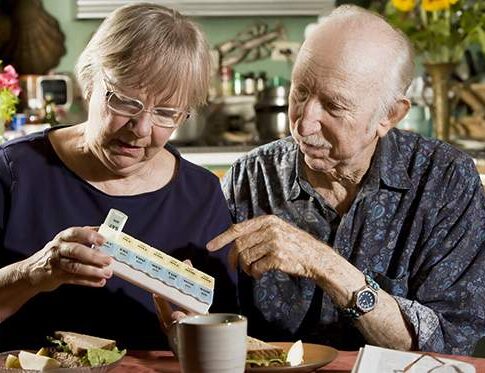Your parents may be taking multiple medications throughout the day and it can be easy for a mix-up to happen.
Studies conducted by the American Society of Consultant Pharmacists have reported that 87% of seniors take at least one prescription drug, while 36% take 5 or more; and 38% use over-the-counter medications.
Taking medicine correctly is essential to your older adult’s health and wellness! That’s why helping your parents with medication management is so important. Understanding what your parent is taking will help to avoid common medication mistakes like taking the wrong drug, missing doses, or taking more than prescribed.
Here are 7 important tips to help your elderly parents safely manage their medications.
1.Make a complete list. Gather up everything your parent is taking and create a list. This includes all prescription drugs, over-the-counter products, vitamins, herbal supplements and occasional remedies, such as sleep or cold medicines.
Be sure to write down:
- Names of each prescription medication, over-the-counter medication, vitamins, and supplements
- How often each is taken and the dosage
- The healthcare provider who prescribed each prescription medication
- The purpose of each medication and/or symptoms it’s meant to treat
- Whether each is for short-term or long-term use
This list will help you and your aging parents understand what they’re taking and when so that you can avoid any mistakes.
2. Connect with your parent’s pharmacist and/or doctor. Once you’ve compiled a complete list of medications, supplements, vitamins and over-the-counter drugs that your parent is taking, share it with their pharmacist and/or primary doctor. They can review and identify redundancies, potential interactions, and side effects and provide recommendations.
3. Keep all medications in one place and stored properly. Locate all the medications, vitamins and supplements your parent is taking and put them in one location. In general, the medication should be kept in a cool, dry place. That means the bathroom cabinet isn’t ideal because moisture and heat can affect the drug. Also, keep medications in a place that kids and pets cannot get to.
4. Find the right pillbox. You can choose from a variety of dispensers and pillbox timers, with pharmacies stocking everything from basic day-of-the-week cups to four-times-a-day expanded versions. Color-coded dispensers often work well. Electronic versions come with alarms to remind patients and let others know when doses are missed. Talking pillboxes can be helpful for patients with vision loss.
5. Pre-sort medications for the week. Staying organized is essential to good medication management for seniors. Using a pill organizer allows you to help your parents pre-sort their medications for the week.
The best type of pill organizer is one with enough compartments for every dose they’ll need throughout the day. If any pills need to be split, do it ahead of time and include those halves in the pill organizer compartments. That way, your parents won’t need to fumble with a pill cutter or remember to split pills before taking them.
6. Make sure your parent understands his or her medications. It is essential that your elderly parent follows the doctor’s instructions when it comes to their medications to avoid the risk of negative drug interactions and potential side effects. Make sure you and your older adult understand which medications are safe to take at the same time and which need to be spaced out to prevent adverse side effects.
If there’s any uncertainty, ask your parent’s doctor for detailed descriptions and instructions to ensure medications are taken correctly.
7. Develop a plan for refilling. It’s important to plan for medication refills. With long-term prescription medications, it’s essential to get refills on time so your older adult won’t run out and miss doses.
- Talk with your parent’s doctor about prescribing a 90-day supply and if they recommend a mail-order pharmacy.
- New online pharmacy services like PillPack or Express Scripts offer online delivery and medication coordination services.
- Talk with your parent’s pharmacist to find out if they offer automatic refills with a notification when the prescription is ready to be picked up.
- Check to see if the pharmacy provides a prescription delivery service that can have medications delivered to the home.
If someone you care for is taking several different medications each day, it can be overwhelming. But understanding the medications, following the doctor’s instructions, staying on schedule, and asking the right questions can help prevent medicine mismanagement.
FirstLight caregivers can provide support with medication reminders. Through our in-home caregivers cannot administer medications, they can provide regular reminders for oral medications or injections. They also can assist with pre-measured medication and the monitoring of side effects or other medical issues.
Find a local FirstLight Home Care location near you and ask them about our special medical dispensers and other helpful home healthcare technology solutions.
SOURCE
U.S. News: www.usnews.com
Agency for Healthcare Research & Quality: www.ahrq.gov
US National Library of Medicine: www.ncbi.nlm.nih.gov
American Society of Consultant Pharmacists: www.ascp.com
